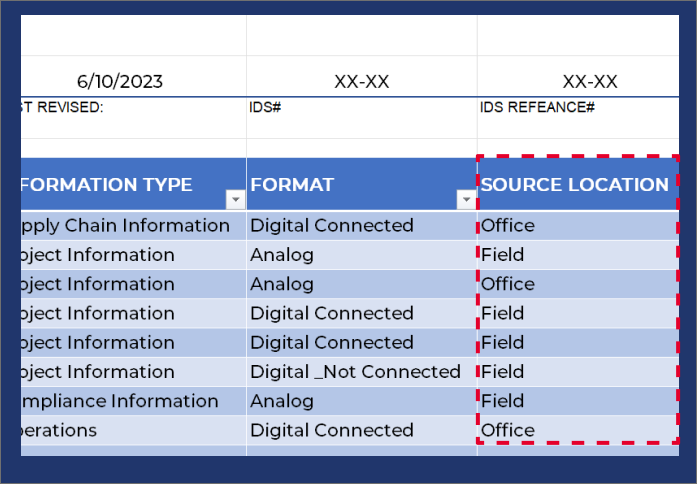Source Location
General
This field has a drop down for the parameters listed below. These represent commonly used parameter labels for data discovery but can be added to on the List Reference tab of the IDS.
Source Location

This field is simply the physical location of the data in question. Again, this is a general field and is intentionally limited to only four locations. Typically, this field is limited to two options; internal sources and external sources. However, in construction internal sources require a slightly higher level of detail. To accommodate, we have broken what is typically internal sources into office, shop and field. These additional source locations will help us better understand the environment that the data is produced in and what level of control we will likely have over that incoming information.
Understanding the location that the data is generated in can have bearing on the ability to get to and work with and access the data. It also can heavily impact the assumptions we can make about the quality and completeness of the data. In general, controlled environments produce better quality data and more complete data than those that are less controlled. This is most relevant when the data is generated by a person. People in a job site environment are often attempting to fill out forms or enter information in the midst of weather, loud equipment and other distractions common to the job site. These distractions often result in errors and omission in the information that they’re attempting to record. Sensitive Instruments and equipment that require cleaning, maintenance, and calibration are also more likely to perform better and deliver higher quality data in more controlled environments.
Best Practices
- Office- The source of the information is generated within the office or administrative environment. This is a good to excellent source location in terms of access and quality of the collected data.
- Shop- The source of the information is generated from a fabrication or maintenance shop owned by the organization but not part of the central office environment. This field can also apply to warehouses and vans. Coil line and fabrication equipment data should have this label. The environment is less controlled in these areas so the data is more prone to errors and omissions.
- Field- The source of the information is generated on a jobsite or other offsite location that work is being performed at.
- External- The source of the information is generated outside of the organization.
Understanding Good Stewardship
 Environmental variables are often overlooked when thinking about the quality and reliability of data. Understanding how environment affects data collection is important as you are asked to extend data collection efforts into less controlled environments.
Environmental variables are often overlooked when thinking about the quality and reliability of data. Understanding how environment affects data collection is important as you are asked to extend data collection efforts into less controlled environments.

